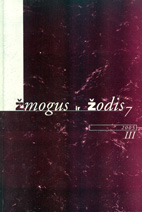Zur Polyfunktionalität der deutschen Modalverben oder: Was ist modal an den deutschen Modalverben?
Multyfunctionality of German Modal Verbs: Are German Modal Verbs Always Modal?
Author(s): Gražina DroessigerSubject(s): Foreign languages learning
Published by: Vytauto Didžiojo Universitetas
Keywords: german modal verbs; multyfunctionality
Summary/Abstract: German modal verbs may perform either deontic or epistemic function. For a long time, the linguistics paid little attention to the epistemic function of modal verbs and named these verbs modal namely because of deontic function. Today, a different view prevails in linguistic studies. It sees only epistemic modal verbs as actually modal. The paper aims at revealing that both deontic and epistemic German modal verbs express modality, which is understood as a communicative pragmatic phenomenon and defined as the speaker's approach to the context. For this reason, the author has researched the usage of modal verbs in the extracts of fiction. The speaker's view is characterised by three constituents, namely, cognitive, affective and volitional. It is concluded that deontic usage of German modal verbs is of more cognitive character, while the modal verbs used epistemically also express the speaker's emotions and wishes. On the other hand, the paper emphasises that there are no clear boundaries between the three constituents of the approach. Usually, namely the context provides modal verbs with certain aspects of modality.
Journal: Žmogus ir žodis
- Issue Year: 07/2005
- Issue No: 3
- Page Range: 85-92
- Page Count: 8
- Language: German

